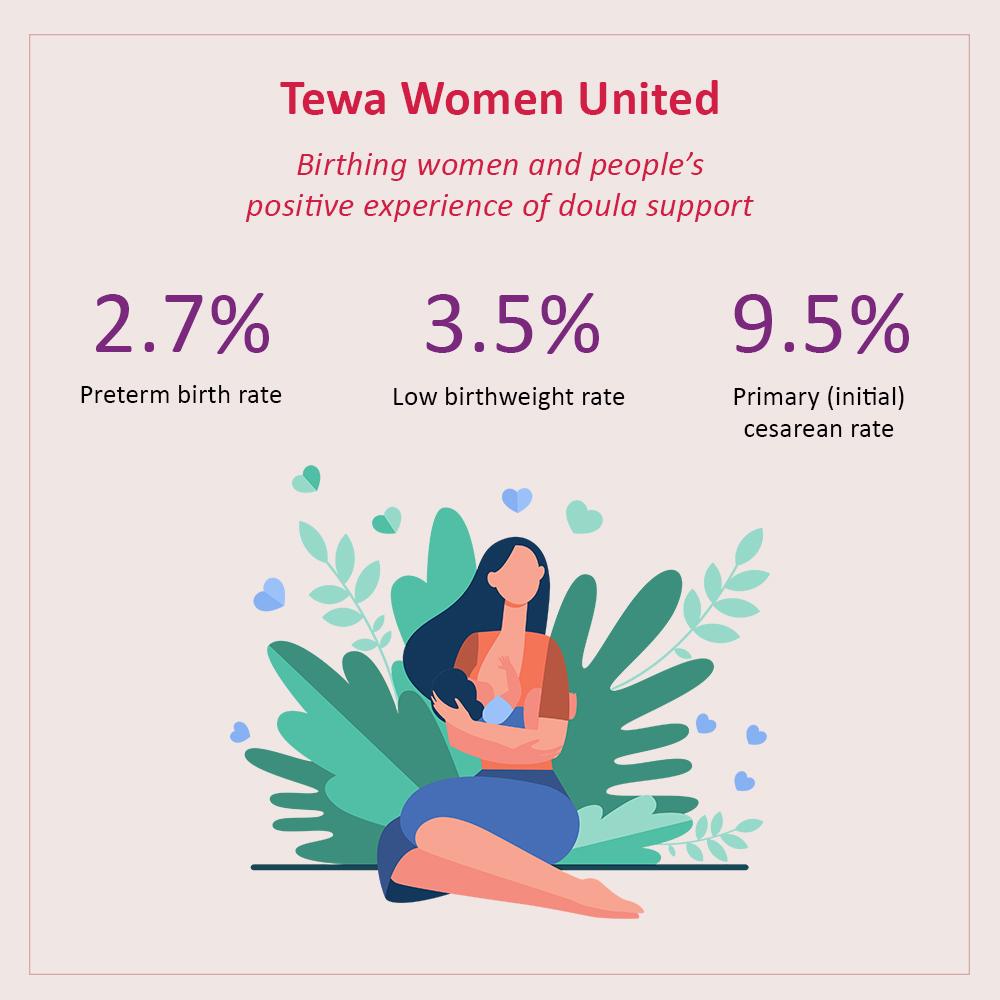
Tewa Women United (TWU)Sarah Ireland, Ruth Montgomery-Andersen, and Sadie Geraghty. “Indigenous Doulas: A Literature Review Exploring Their Role and Practice in Western Maternity Care,” Midwifery, August 2019, https://doi.org/10.1016/j.midw.2019.04.005; Tewa Women United and Indigenous Women’s Health & Reproductive Justice Program. Expanding Access to Doula Care: Birth Equity & Economic Justice in New Mexico, March 2020, https://tewawomenunited.org/wp-content/uploads/2020/08/TWU-Expanding-Access-to-Doula-Care-March-2020.pdf is a multicultural and multiracial, Indigenous/Tewa-women-created and -led organization located in the ancestral Tewa homelands of northern New Mexico. TWU embodies courageous spaces that center Indigenous women and girls to connect with ancestral knowingness, healing strengths, and lifeways for the well-being of all. TWU is grounded in multi- movements/issues of environmental, gender, reproductive, and healing justice. Central to this work is the Yiya Vi Kagingdi Doula Project, which began in 2008, and the Yiya Vi Kagingdi Full- Spectrum Community Doula Training, which began in 2018 (Yiya Vi Kagingdi means “mother’s helper”). Full-spectrum doulas provide support from before conception through all the ways pregnancy ends, including birth, abortion, miscarriage, and stillbirth.
The community-centered Yiya Vi Kagingdi Doula Project was created in response to a survey of women in the six Tewa-speaking pueblos and as one approach to mitigate violence against women, children, and Mother Earth. The program supports birthing people and their families with about three prenatal home visits, continuous support while giving birth, about three postpartum home visits, and lactation support, as well as remote support, all within a birth equity framework. TWU collected data over eight years and found striking benefits for birthing women and people participating in their doula program, including:
- Preterm birth rate of 2.7 percent, versus 9.8 percent for New Mexico overall, 8.2 percent for Indigenous New Mexicans, and 9.4 percent for Hispanic New Mexicans
- Low birthweight rate of 3.5 percent, versus 9.1 percent for New Mexico overall, 8.2 percent for Indigenous New Mexicans, and 9.4 percent for Hispanic New Mexicans
- Primary (initial) cesarean rate of 9.5 percent, versus 13.7 percent for New Mexico overall, 14.4 percent for Indigenous New Mexicans, and 14.8 percent for Hispanic New Mexicans
In contrast to mainstream doula training organizations that do not emphasize the value of culturally congruent healing support for trauma survivors, and disproportionately reach affluent white birthing people through a private-pay model, the more encompassing TWU doula training program includes content relating to reproductive justice, decolonization of birth, trauma- informed care and healing, perinatal mental health, social needs, full-spectrum support, and reclaimed Indigenous birthing traditions. The Yiya Vi Kagingdi Doula Project and training also work to address postpartum depression and substance-using parents.
TWU promotes economic justice and reciprocity by training community doulas to do meaningful wellness-focused work, making doula support available to families without undue economic burden, and advocating for living-wage compensation for doula services.
Doula services are provided at low to no cost, and doula training is offered at no cost, in exchange for providing doula services to three families without charge.Tewa Women United. “Yiya Vi Kagingdi Doula Project,” accessed August 14, 2022, https://tewawomenunited.org/yiya-vi-kagingdi-doula-project; —. “YVK Full Spectrum Doula Training,” accessed August 14, 2022, https:// tewawomenunited.org/yvk-full-spectrum-doula-training
Back to Improving Our Maternity Care Now Through Doula Support

